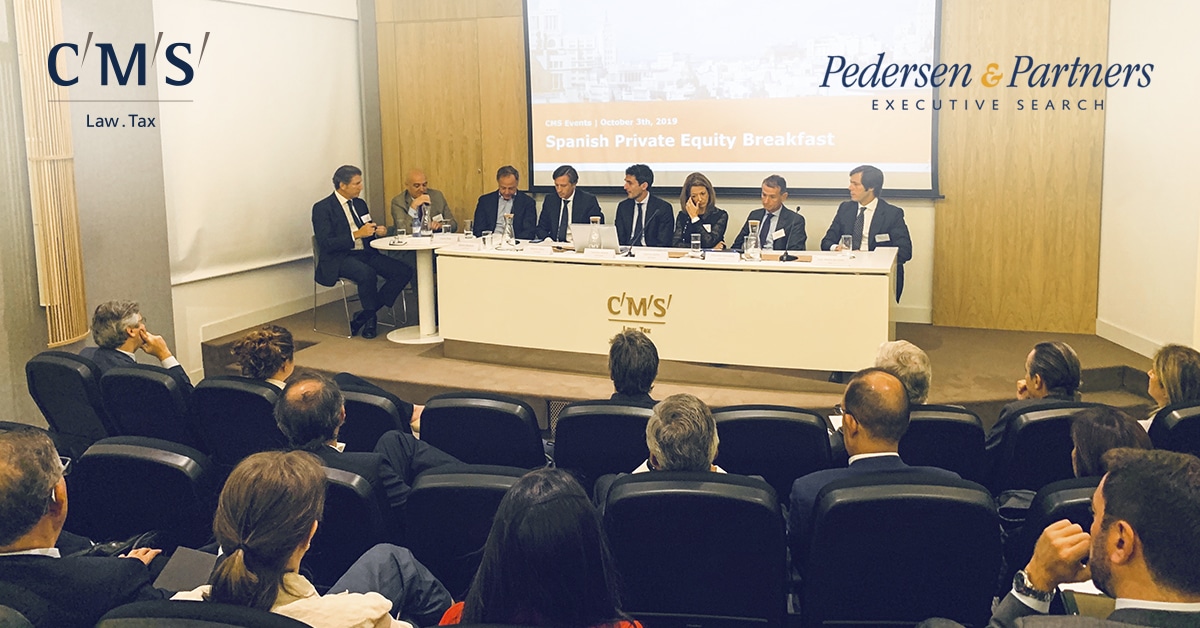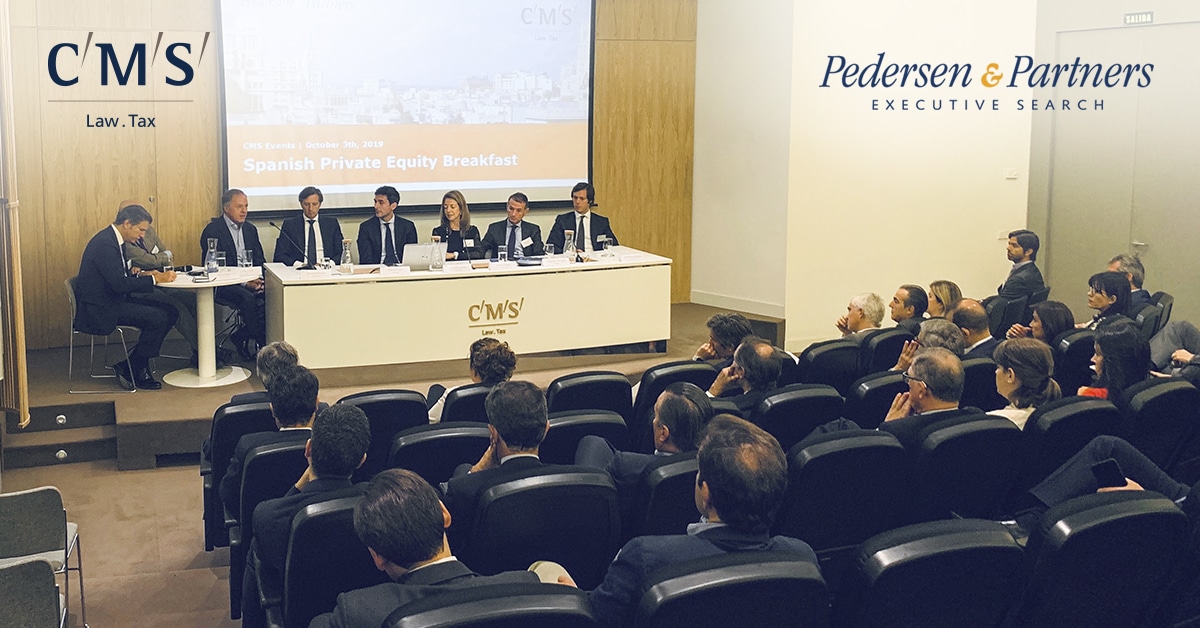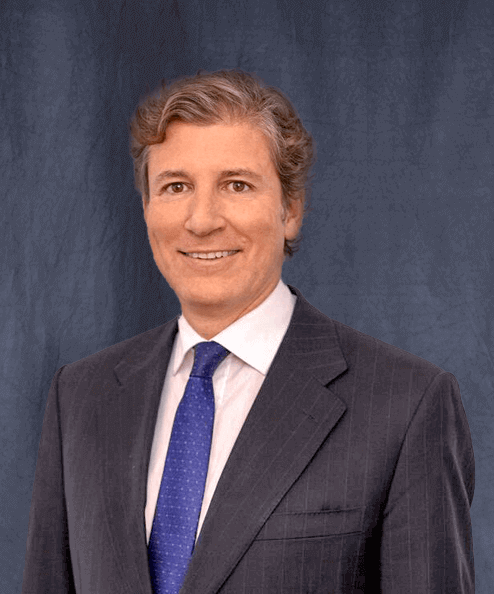Insights from the 2019 Spanish Private Equity Breakfast hosted by Pedersen & Partners and CMS
What are the recent developments and trends in the Spanish M&A market – including deal flow, valuations, funding, availability of credit for leverage financing, exit routes and co-investments? What are the high opportunity sectors and market segments? What are the value creation and portfolio management strategies? How can CEOs be more creative and add value? How does the geopolitical arena impact deal sourcing, management of the investments and exits, and what external factors are significant? What are the main sources of capital during fundraising, and how is this evolving?
These were just a few of the questions raised at the 2019 Spanish Private Equity Breakfast in Madrid, co-hosted by international Executive Search firm Pedersen & Partners together with international law firm CMS, in which representatives from well-known Spanish and international private equity funds held discussions in a lively and agile atmosphere.
The high calibre event gathered more than 70 professionals to ensure a range of perspectives, including: Carmen Alonso, Head of Iberia of Tikehau Capital, Carlos Carbó, Founding Partner and CEO of Nazca Capital, Eduardo González, CEO of Eugin Clinic, José María de León, Director of H.I.G Capital, Álvaro Olivares, Partner of Corpfin Capital and Alberto Yanci, Partner of Proa Capital. The panel discussion was co-chaired by Carlos Peña, Partner of CMS and Álvaro Arias, co-head of the global Private Equity Practice at Pedersen & Partners, and the talking points included sources of debt: bank versus debt funds, managing and relating to CEOs of portfolio companies, fundraising strategies, investment opportunities during down cycles, and Spain itself as an investment destination.

Debt
There was a lively debate about the best way to get leverage to invest in a mid-market deal: from banks or from debt funds? Those who favoured using bank debt pointed out the lower interest costs, while those who favoured debt funds highlighted the greater flexibility. Some of the contributors considered that the approaches are complementary, and suggested the possibility of using hybrid debt structures.
Portfolio management
Each fund manager has their own strategy for managing investments and relating to the CEOs. Some strategies are common to all, such as getting close to the CEOs and partnering with them. Trust is critical, especially when CEOs propose new strategies or ideas to generate further value. CEOs manage expectations by aligning budgets with reality. An awareness of the economic cycle, and the importance of adapting growth or efficiency strategies to fit it, was mentioned as a critical success factor.
Economic Cycle
There is a consensus that Private Equity is undergoing a good period in terms of deal generation, exits and fundraising in an environment of high liquidity. Nevertheless, there is also consensus that the economic cycle has already peaked, and a period of slower growth has arrived. This is not necessarily bad, as many opportunities arise during economic downturns.

Fundraising and exits
Fundraising is becoming more transparent than ever. The Limited Partners market is going through a disintermediate process, with funds facing increasing difficulties in justifying their added value. Meanwhile, Private Equity fund managers are going directly to institutional investors.
Sectors of interest
Last year the main investment sectors in Iberia were energy, telecoms and services, although the consumer sector was also attractive. However, manufacturing saw only 8% of the total investment. During 2019, the distribution shifted with energy at the top, but investment in services and consumer sectors dropping. Next year’s most attractive opportunities may be in niche defensive sectors such as natural ingredients for all industries, and activities related to the ageing of the population.
The race for the best deals is set to continue, as Private Equity continues to consolidate its position as an active investment asset class. Spain is a good destination for mid-market investment (10 to 100 equity tickets) with good opportunities and still some discounts in valuations compared to other European countries. The total Private Equity investment in Spain has already passed 0.5% of GDP – above the European average – and continues to grow.

Alvaro Arias Echeverria is Partner and Co-Head of the Global Private Equity and Venture Capital Practice at Pedersen & Partners. Mr. Arias brings over 15 years of Executive Search experience, having successfully completed Executive Search assignments across Europe and Latin America with a particular focus on Retail, Manufacturing, Energy, Health, and IT. Prior to joining the firm, Mr. Arias held senior positions as a Partner and member of the International Executive Committee at Neumann international. Earlier in his career, he was Principal at Egon Zehnder International and Senior Manager at AT Kearney. He was also Professor at IESE Business School where he founded and led its International Finance Research Centre in Barcelona and Madrid. Mr. Arias graduated as an Engineer from the Polytechnic University of Madrid. He holds an MBA from IESE Business School and has completed the Doctoral Program in Corporate Governance from the City.
Pedersen & Partners is a leading international Executive Search firm. We operate 57 wholly owned offices in 53 countries across Europe, the Middle East, Africa, Asia & the Americas. Our values Trust, Relationship and Professionalism apply to our interaction with clients as well as executives.
If you would like to conduct an interview with a representative of Pedersen & Partners, or have other media-related requests, please contact: Diana Danu, Marketing and Communications Manager at: diana.danu@pedersenandpartners.com
